Ignoring drug cartel danger, Mexican families scour wilderness for missing loved ones' remains
HUITZILAC, Mexico — Jesus García pushed a long metal rod into the ground, then brought the tip to his nose, trying to detect a telltale putrid scent.
He couldn’t quite place the odor, so he passed it to his wife, Claudia San Román. It’s just “roots,” she said, grass and weeds.
“Let’s keep going,” she urged.
The group, mostly made up of women, had been searching for three hours in the Mexican state of Morelos. Amid the heat and insects, they had to use ropes to get down to the riverbed where they based their search.
Their objective? Human remains.
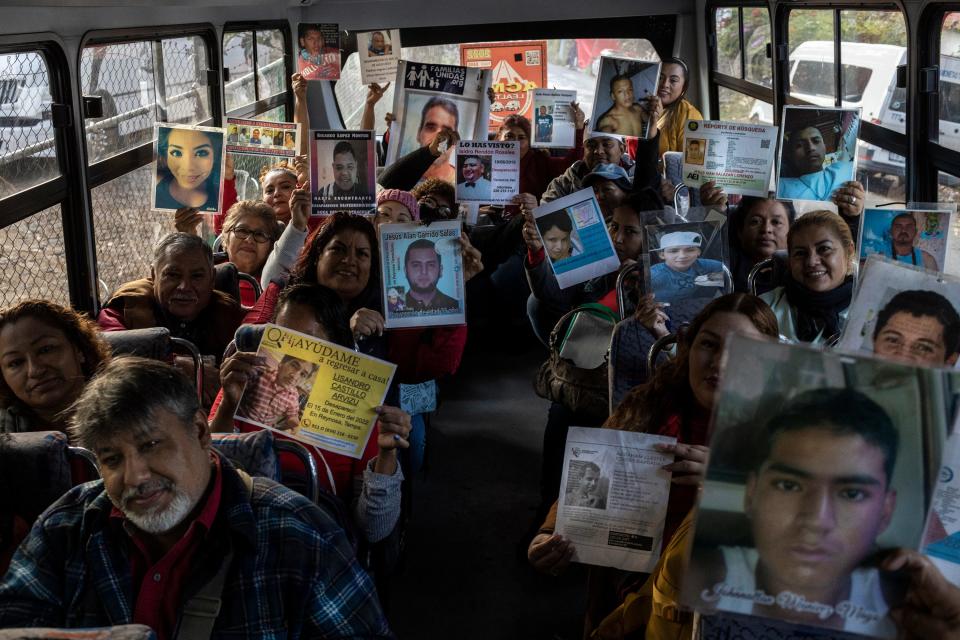
It was Day 1 of a two-week mission by the VII National Search Brigade for Disappeared Persons. Acting on anonymous tips, the members of the group were desperately looking for their missing relatives, many of whom had vanished years ago.
Jesus and Claudia have been looking for their daughter, Kary, for over a decade. She went missing in 2011 when she was 26.
During the search, Claudia wrote a letter about her daughter: “A cheerful young woman, very hard working and concerned about everyone. She loved me, and I love her; I hope she returns so we can never be separated again.”
More from Mexico:City hall massacre: Local Mexican leaders risk lives to stay in office in cartel territory
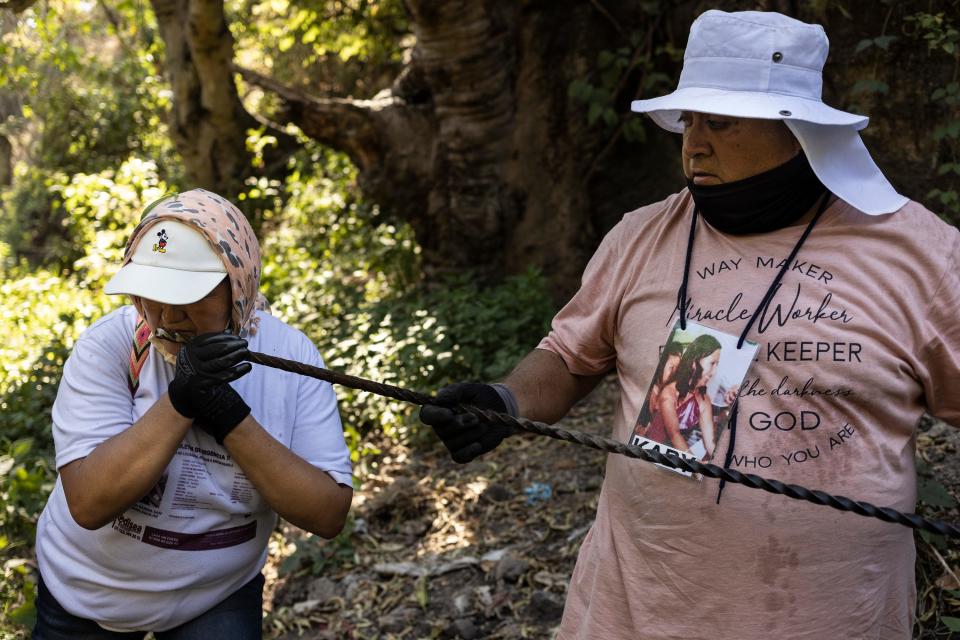
Eleven years later and more than 70 miles away from where she disappeared, the couple said they remain hopeful that one day they will find their daughter's remains.
At least 108,680 people are missing in Mexico, dating to 1964, according to a report from the interior ministry.
The number continues to grow as the undeclared war involving organized crime and Mexican security forces rages on. Those caught up in the conflict sometimes vanish, their bodies disposed of in shallow graves in out-of-the-way places.
“Here we are, and we will continue fighting and searching until we find her,” Jesus said later, his voice tired as the search reached its fifth hour.
The government’s role in finding the missing amid Mexico's drug war
According to some experts, a lack of will from the government has led to the rise of these search groups.
“The inefficiency of the state has led to a specific group of society linked to the victims of forced disappearance in Mexico to take the initiative to do what the state does not do, which is to investigate what happened to their relatives,” said Erubiel Tirado, a specialist in national security and human rights.
Mexico’s president doesn’t agree.
Travel:With drug cartel violence, is it safe to travel to Mexico? Security experts weigh in
"No government had worried about the disappeared like now. The entire Ministry of Interior is dedicated to that and looking for clandestine graves because it should not be forgotten that there was a war against drug trafficking in which many disappeared," President Andres Manuel Lopez Obrador said in May.
Tirado said disappearances have become a resource for organized crime, “But let us remember that there is no organized crime without the complicity of state authorities."
‘I don’t have a life’: Parents of missing find purpose with searches
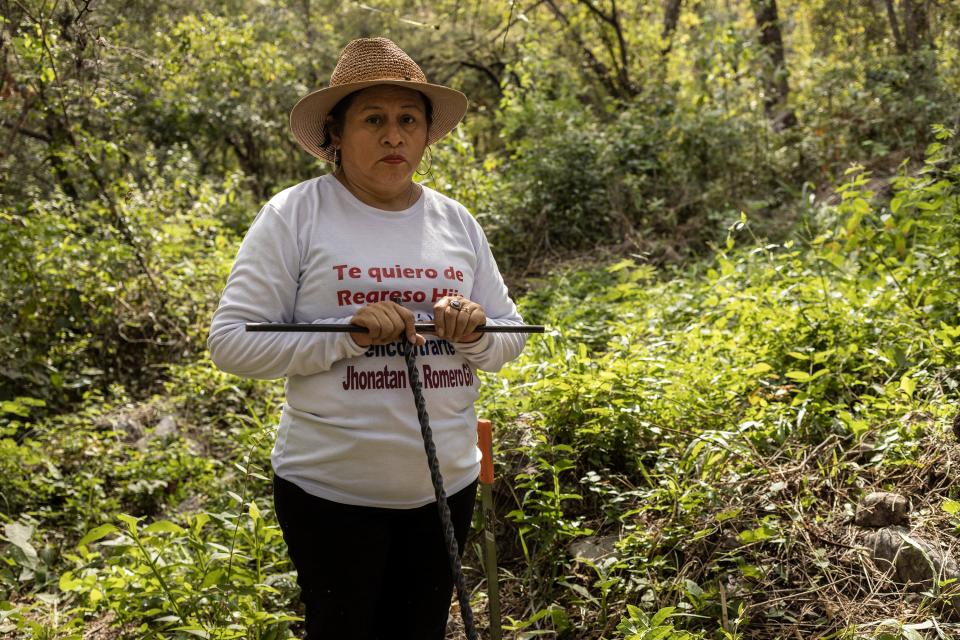
Socorro Gil has an automatic reply for anyone who asks about her son.
“My son's name is Jhonatan Guadalupe Romero Gil. He was disappeared by municipal police officers in Acapulco, Guerrero, on Dec. 5, 2018,” said Gil, who also took part in the Morelos search.
Her story jibes with many of the other parents’ stories. They say the last time they saw their loved one, they were in police custody.
It’s the fifth time Gil has attended one of the search events. She has become an expert with digging, smelling, and recognizing if a bone belongs to a human or an animal.
Related:Outbreak of Mexican cartel violence targeting innocents raises worries of what’s to come
“I have mixed feelings when coming here because thinking that we can find our children is overwhelming, but at the same time, we want to find them even if they are buried,” said Gil, shovel in hand, in a woodland in Huitzilac, Morelos.
“I don't have a life,” she said. “When I eat, I feel that the food has no taste, and I can spend whole nights without sleeping, thinking about where he is, where they left him, why they killed him.”
When asked how long she would continue looking for her son, Gil didn’t hesitate: “Until I find him.”
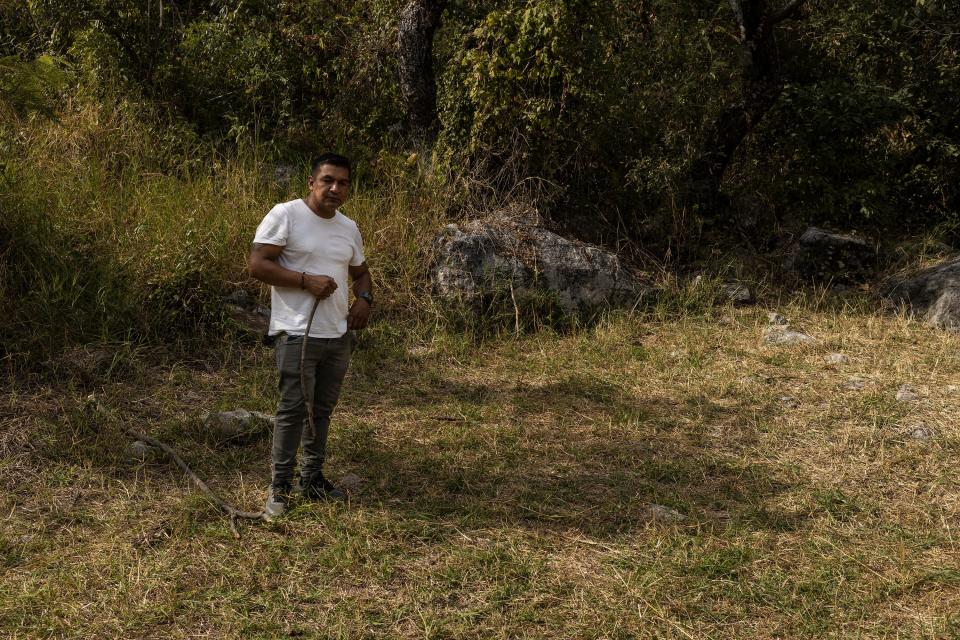
A short distance away, something compelled Ignacio González to begin searching a small clearing next to the woods.
He was startled by what he found as he pulled back the grass: a jawbone with a few teeth still attached, and other unidentified bones.
“I don't even know why I checked. I felt like someone asked me to do it. I felt weird,” González said.
The group gathered for a look at the find, their relief tinged with a bit of fear for what — more specifically, who — the bones may represent.
“At least one person will be able to return home now,” one of the mothers said of the remains.
‘Corruption, apathy, lack of political will’
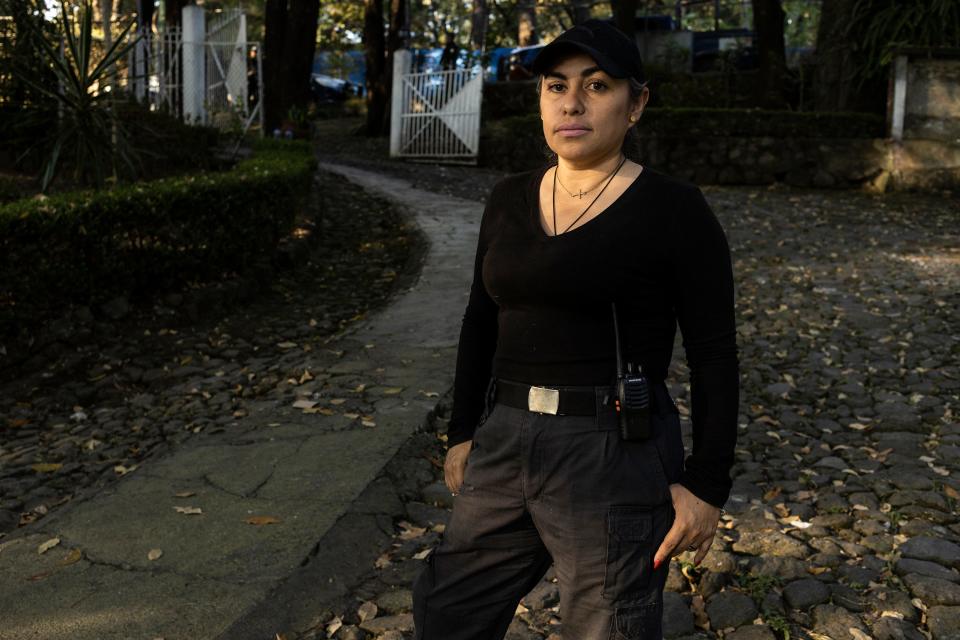
Yadira González is part of the VII National Search Brigade for Disappeared Persons. She has been looking for her missing brother since 2006.
She gets teary-eyed just by hearing the name Juan.
She doesn’t want to be called a leader of the brigade, but her strong voice resounds in every corner of the camp where they are staying during the days of searching. She gives guidance, orders and comfort. And she also faces the authorities when needed — something that happens often.
The searches must be held in conjunction with government officials, which can lead to bureaucratic delays.
The Morelos search experienced delays because there were not enough security personnel and forensic experts to process remains.
The locations in which the searches take place are usually remote and dangerous, leading to a need for security. It stands to reason that the people who buried the remains would rather they are never found, which adds to the danger.
Prior coverage:As Mexican drug cartels muscle in on massive avocado sales, armed civilians fight back
After a brigade member finds potential human remains and the expert arrives and recognizes its legitimacy, it becomes a crime scene that must be processed by the local prosecutor’s office to authorize the DNA identification.
The remains found in the Morelos search had to be watched over by the searchers and local authorities day and night until a forensic team could be found.
“The problem once again is the lack of commitment from the Mexican government. And I'm not talking about this prosecutor's office; this happens in the whole country,” González said.
“It’s their [way] of making the issue of the disappeared invisible. It’s not convenient for them that the mothers from all over the country are getting results.”
González said the fastest she’s got a DNA result back from one of the searches was six months.
“They’re out of capacity. They also don’t have enough money. There is also corruption, apathy, lack of political will, and they only answer negatively, so we can say it could take a year to receive the results from yesterday’s finding,” she said of the Morelos find.
In a statement in May, the United Nations warned that the landmark of 100,000 disappearances in Mexico reflects a pattern of impunity.
“The Committee on Enforced Disappearances and the Working Group on Enforced or Involuntary Disappearances are deeply concerned about this dire situation. We also note that, in many cases, disappearances go unreported, and thus the scale of this tragedy may even go beyond what is currently registered,” the statement reads.
The case of the 43 students from the Ayotzinapa Rural Teacher’s College who were forcibly abducted in Iguala Guerrero by police officers in collusion with organized crime in September 2014 is an example of how things got this bad.
What happened to the group of 43 students was never known. The remains of only two of them have been identified, according to officials.
Mothers killed, targeted for their search for missing loved ones
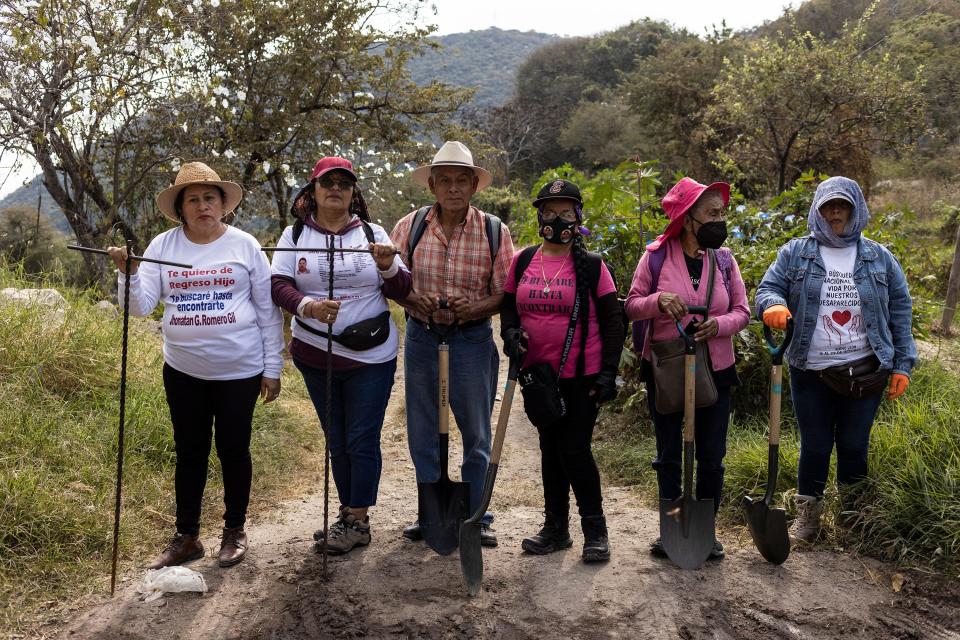
Since 2021, five mothers from search groups have been killed. The most recent, Maria Vázquez Ramírez, was shot dead in Guanajuato state in November. She was looking for her son, Osmar, who disappeared in July.
In October, armed men shot dead Esmeralda Gallardo, who was looking for her missing daughter.
“It’s a painful situation. It’s something that absolutely no one should allow,” González said, “It’s something that should hurt absolutely everyone.”
Experts like Tirado say seeker mothers represent a threat to Mexico’s drug cartels and some local governments involved in collusion.
“… Seeker mothers for victims of forced disappearance become a risk of evidencing this collusion,” said Tirado, the security specialist.
“That's why they kill them.”
A day after a Courier Journal team finished its coverage with the seekers' group, the brigade continued its field search. On Dec. 1, some unidentified people fired shots at the search site “to stop the proceedings that were taking place there,” a statement from the brigade said.
“The attacks suffered today, and the lack of guarantees on the part of the authorities of the Mexican State to guarantee the safety of the families in their search have the intention of limiting, minimizing, and stopping the search… Searches are NOT paused or postponed,” the statement read.
Gonzalez said she knows she doesn’t have many years left to continue with the searches at her current energy level.
“I expect a change from civil society and also from the youth, who will stay in this,” she said with a tired but firm voice. “… Now it’s up to the youth to initiate the change, but not to look for the missing — rather do something so that they do not have to look for them anymore.”
Karol Suárez is a Venezuela-born journalist based out of Mexico City. She is a contributing writer to The Courier Journal. Follow her on Twitter at @KarolSuarez_.
This article originally appeared on Louisville Courier Journal: Mexico's drug war: Families search for human remains of loved ones

